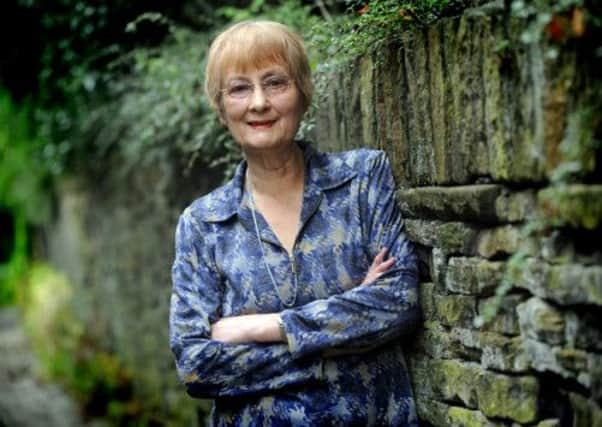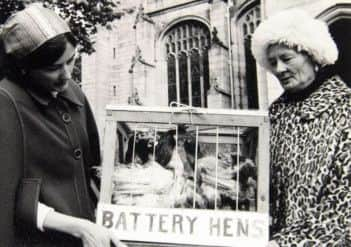Story of Chickens’ Lib and the family who made feathers fly in food industry


In many ways Clare Druce was a woman ahead of her time.
Back in the 1970s, Britain was just embarking on its love affair with fast food. TV dinners, which had an air of US glamour, had not long arrived from across the Atlantic, Findus Crispy Pancakes and Angel Delight were forging new culinary boundaries and while Wimpy Bars had been with us since the 1950s, it was only in the 70s that burger and chips became a national dish.
However, while the rest of us were blindly filling our supermarket trollies with the latest exciting development in convenience food, Clare, along with her mother Violet Spalding, was launching one of the very first campaigns against factory farming and in particular battery hens.


Advertisement
Hide AdAdvertisement
Hide Ad“My interest was first triggered when I read Ruth Harrison’s seminal book Animal Machines, which was an expose on how the post-war quest for cheap food led to factory farming. She laid bare how that had resulted in a dangerous cocktail which was both cruel to animals and inherently dangerous to human health. I lent the book to my mother; she had a gut feeling for sustainability long before it became fashionable and together we decided we couldn’t bury our heads and ignore what was going on.”
Today, social media would have made it easy for Clare, who moved to Yorkshire shortly after the pressure group was launched, to reach out to like minded people. Forty years ago, campaigning was a labour-intensive affair. Over the decades mother and daughter wrote hundreds of letters to companies like Heinz and well-known chefs. Most didn’t bother to reply, although they did get one letter back from the managing director of Shippam’s paste who said he would happily take Jesus Christ round his factory to discuss how it obtained its raw material.
In those early days the campaign was a bit of a kitchen table affair, but a name change catapulted mother and daughter into the national spotlight. “I remember we were in the offices of the Daily Telegraph,” says Clare, who lives in Holmfirth. “We’d spent hours carrying a cage around London with four semi-naked hens we’d rescued from a farm peering out saying the same thing over and over again, ‘These are battery hens. Eighty per cent of all UK laying hens live like this. Please don’t buy battery hens’.
“We’d gone to try and get some coverage in the paper, but the reporter who was sent down to see us wasn’t exactly impressed. We told him we were the Barnes Action Group and his immediate response was, ‘You’ll never get anywhere with a name like that’. He was right, he made us feel like complete amateurs.” That’s when Violet wondered aloud, “What then? Chickens’ Lib?”
Advertisement
Hide AdAdvertisement
Hide AdWith Women’s Lib already providing much fodder for the press, the media took the new name and ran with it. Those two little words said it all. Buoyed by a bigger profile, Clare and Violet staged demonstrations inside the Ministry of Agriculture, they caged humans in Parliament Square and were memorably thrown out of Wakefield Cathedral by the Provost and pursued by the police. Along the way they were joined by the likes of Spike Milligan, Joanna Lumley and Bill Owen – the latter’s involvement in the campaign temporarily saw filming suspended on The Last of the Summer Wine when a gamekeeper who had taken exception to his views prevented the BBC crew from accessing moorland above Holmfirth.
Clare revisited those events during the writing of Chickens’ Lib, which is both a history of the pressure group and expose how little has changed. While food miles, organic and sustainability have become buzzwords frequently trotted out by an industry desperate to be seen as ethical, the claims, she says, are often hollow.
“We’ve been hoodwinked. The campaigns run by groups like Chickens’ Lib did lead to much stricter European Union legislation, but the sad truth is that it’s not being enforced. A small number of multi-national companies have an iron grip on world food production and it’s all about maximising profits. Most intensive farming takes place behind closed doors in windowless buildings, often behind high barbed wire fencing and well-protected by electronic security devices. However, governments must be challenged. We can’t meekly accept that the legislation which should be protecting farmed animals is failing to do so.
“If we don’t do something people 100 years on will look at the way we feed the population as barbaric in much the same way the slave trade is viewed in hindsight. We need to set a precedent and I really believe that a body like the RSPCA should head a landmark prosecution because that’s the only way things are going to change.”
Advertisement
Hide AdAdvertisement
Hide AdClare wound up Chickens’ Lib three years ago. While it had been one of the very first pressure groups to highlight factory farming, 40 years on with so many other groups now dedicated to the cause it seemed like the right time to let someone else lead the fight. However, while Clare may no longer be producing the regular, detailed newsletters, packed with statistics about the food industry’s failings, she is no less vocal.
“In the early days when we’d turn up to the offices of the Ministry of Defence with four birds, known as the Halifax Four, which we’d bought from a nearby battery farm they thought we were just two slightly barmy women. However, everything we said was based on careful scientific research and when they realised that, then they couldn’t ignore us so easily. That was one lesson we learnt early on - yes you grab people’s attention with shocking images, but you have to be very clear of your facts.”
Central to Chickens’ Lib campaign was highlighting the extensive use of antibiotics within the food chain, fearing we could reach the point where we become resistant to the most effective antibiotics. According to the very worse case scenario, when that happens we could be at risk of another global pandemic not unlike Spanish flu which in 1918 killed up to 100 million people.
“It’s not a scare story, it’s a real possibility,” says Clare. “The most recent statistics for antibiotic use are from 2007 and they show that while 54 per cent of all antibiotics produced are for humans, a staggering 40 per cent are sold for food producing animals. There’s no question that the UK’s department of agriculture recognises the dangers of on-farm antibiotic abuse but it’s also a very lucrative business.
Advertisement
Hide AdAdvertisement
Hide Ad“The pharmaceutical industry ensures that millions of animals stay alive until ready for slaughter so keeping the wheels of British factory farming turning. Ministers don’t want to risk upsetting big business, so the only way that we can change things is as consumers.
“Everyone who eats beef, chicken, pork and lamb should remember that the drugs administered so freely to farmed animals are frequently either related to or identical to the ones we give our children in an emergency or take ourselves when we become sick. Last year Margaret Chan, director of The World Health Organisation, told an assembly of infectious disease experts in Copenhagen that the now widely predicted post-antibiotic era would mark an end to medicine as we know it. What we now think of as routine operations could become too risky to carry out and minor injuries could once again prove fatal.”
Chickens’ Lib were never against veterinary drugs per se, but Clare feels something must be done. “We can’t keep going on the way we are and we can’t keep eating as much meat as we are. Chefs like Jamie Oliver and Hugh Fearnley Whittingstall have exposed the ‘turkey twizzler’ scandals, yet at the moment at least nothing seems to deter the public from a meat-based diet, but the way we feed our growing population is doomed to failure.
“Things are changing, but it may be too late.”
Chickens’ Lib by Clare Druce is published by Bluemoose Books priced £18. To order a copy through the Yorkshire Post Bookshop call 01748 821 122.
UK food industry
Advertisement
Hide AdAdvertisement
Hide AdFood manufacturing is the UK’s single largest manufacturing sector. The food and drink supply chain is a major part of the UK economy, accounting for seven per cent of GDP, employing 3.7m people, and generating £80bn per year.
The average UK household now devotes about nine per cent of its expenditure on food, down from 16 per cent in 1984 – a figure that at one time was even higher than this.
£164m: this is the amount invested by Defra and the food industry in agricultural research and development each year.
£15bn: the estimated overall costs of animal diseases to the UK over the past 15 years through production losses and the implementation of control strategies.